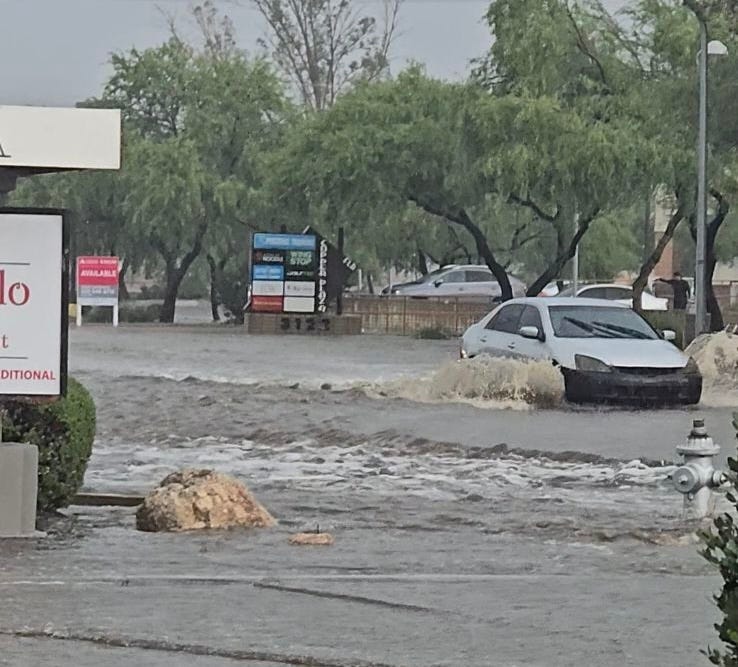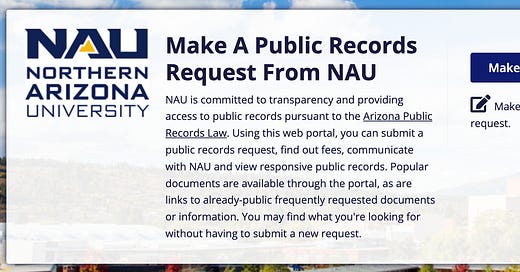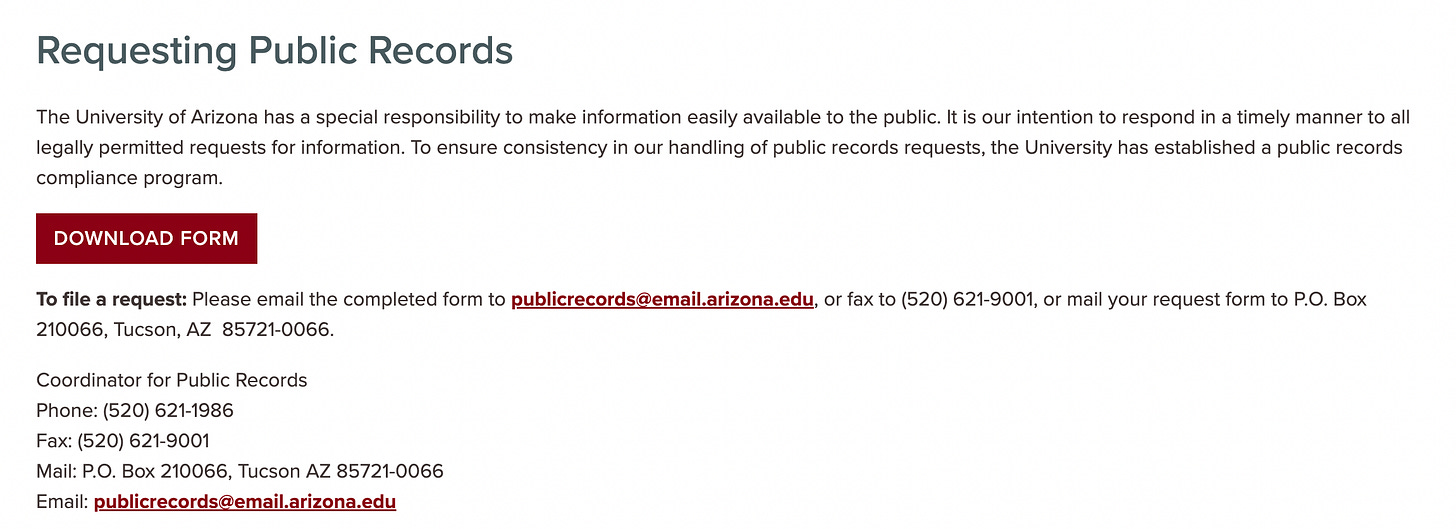The Daily Agenda: The cost of convenience
The University of Arizona is modernizing its record request system ... But this ease of access isn't free ... More constable candidates enter the race.
School may be out for the summer, but there’s still plenty happening behind closed doors over at the University of Arizona.
On Thursday, the UA’s Office of Public Records sent an email alerting people with outstanding requests that the office is “undergoing significant changes” and will be transitioning to the online portal, NextRequest, as of July 1.
The goal is to improve how the office manages requests, which we fully support, since the current system involves emailing a form to the office and waiting for a response, which can sometimes take more than a year (Caitlin once waited 18 months for the UA to decline a request citing attorney-client privilege.)
There isn’t a system for members of the public to track and manage requests, and if you forget that you have one in, the office isn’t going to remind you until (and if) it’s filled.
But the downside to the change is that it comes at a cost, and not just to the UA, but also to members of the public who are exercising their freedom of information rights.
While requests made by June 30 will still be filled for free, starting July 1, the UA is moving to a fee schedule for all requests, both commercial and non-commercial.
Reporting the news is considered a non-commercial endeavor, and in many cases, outlets are exempt from fees. But under the UA’s new system, we won’t be and it’s unclear how much we’ll have to pay to access public information about a state-funded school.
This means if we want to know how many employees were hired or let go in a given period of time, we’ll have to pay to find out.
If we want to find out details about the contract of a new coach or administrator, that’s going to cost us.
Details about department expenses and budgets; the companies and people with whom the UA does business; the school’s revenue sources and so much more will all come with a price tag.
The UA says that the move is to align with “practices at other Arizona Board of Regents institutions,” but a quick search of the public record websites of the other two ABOR universities (Northern Arizona University and Arizona State University) shows that they charge different amounts and in the case of NAU, some records are free.
UA spokeswoman Pam Scott said that the UA is working with ASU, NAU and ABOR to set the new fee schedule, which they expect to finalize and publish on July 1.
We’ll be curious to see what they’ll come up with, since the current fee schedules are pretty different. Over at ASU, non-commercial requests of more than 25 pages in any calendar month will result in a charge of $0.20 per page, regardless if it’s produced in hard copy or digital format. There’s also a fee of $10 per hour of staff time, charged in 15-minute increments, although the school “may not charge for the cost of searching for records.”
The fee for staff time doesn’t seem to jive with the state’s public records law, which allows for charges to cover the cost of photocopying and postage, but says nothing about labor.
At NAU, the cost of duplicating paper records for non-commercial requests is $0.25 per page, but there’s no charge for electronic records provided through its NextRequest portal.
But regardless of what fee schedule the UA ends up with, the timing doesn’t seem ideal, when public interest in the school’s finances and business dealings seem to be at an all-time high.
The UA has been under a microscope for the past seven months, after announcing a $240 million budget shortfall last November.
In the time since, the dollar amount of the financial “miscalculation” changed more than once and President Robert C. Robbins came under fire when we broke the news that the former chief financial officer who seemingly resigned in connection with the situation was actually just transferred to another position.
After we learned about former CFO Lisa Rulney’s non-resignation, we filed several records requests with the UA and reported on our findings, writing stories about the salaries of the UA’s top administrators, changes to athletic program rosters, the lack of records associated with a controversial former quarterback and more.
We’re not sure how much we would have ended up paying for those records (the salary database included 12,775 employees,) but as a startup news outlet, every dollar counts.
To be clear, we understand the value of public records and won’t ever stop asking for them, but this new fee schedule does complicate things a bit.
And if we asked for all that information and more (we still have two outstanding requests,) we’re sure plenty of other outlets and community members made requests of their own.
The irony is, there’s no way to know how many requests they received or filled since November’s news of the financial crisis broke without making a request for that information.
And since we don’t want to pay for that information or slow down our future requests by adding to the queue, we’re not going to be the ones to ask.
If you’d like to support our efforts to access public records at the UA, you can upgrade to a paid subscription or make a donation to our GoFundMe.
Step right up: A county constable election that didn’t have any candidates now has two write-in candidates, the Tucson Sentinel’s Jim Nintzel reports. John Escobedo and Gerard Acuña filed paperwork for the position in Justice Precinct 9. Incumbent George Camacho planned to run for re-election, but a judge ruled he didn’t have enough valid signatures to get on the ballot. The deadline to run as a write-in candidate was June 20. There still may be some questions that need to be resolved about whether Acuña lives in the district where he’s running.
It’s complicated: The high rate of turnover at the Pima County Attorney’s Office continues to be a big issue in the race between County Attorney Laura Conover and challenger Mike Jette, Arizona Daily Star columnist Tim Steller writes. The pattern behind the turnover is complicated and includes attorneys leaving for higher-paying jobs, burnout from caseloads, and dissatisfaction with how Conover runs the office.

Filling budget holes: Consultants are saying the University of Arizona should raise ticket prices and sell the naming rights to the football stadium, the Star’s Ellie Wolfe reports. Those changes would raise $18 million and help cover the $30 million deficit the UA athletic department is facing, analysts from Ernst & Young said. The analysts also said the department is “inconsistent” with its accounting, which fouls up the department’s budget reports.
Lightning fast: The high cloud bases in Southern Arizona make for photogenic lightning strikes, and that is drawing more storm chasers here, KGUN’s Blake Phillips reports. But on the flip side, storm chasers in Southern Arizona have to be fast on their feet if they want to get a photo of lightning in a monsoon storm, compared to huge storms that last for hours in the Midwest.
For the time being: Border Patrol apprehensions of migrants and asylum seekers in the Tucson Sector went down 40% in the first week after President Biden issued executive orders restricting asylum, KGUN’s Adam Klepp reports. Apprehensions remain at record levels and short-term drops in border crossings often follow big policy announcements, before rising again. And, Klepp notes, the policy has taken a human toll on migrants who find themselves unexpectedly deported to Nogales, Sonora.
Sorting it all out: The Nogales International’s Angela Gervasi breaks down what’s known so far, and what’s still unclear, about the scandal unfolding at the Santa Cruz County Treasurer’s Office, where $4 million went missing from county bank accounts and the treasurer is now under investigation.
2: The inches of rain some parts of the Tucson area saw on Saturday when thunderstorms came through.










It seems suspicious that a new records system, likely intended to be more efficient and easier to manage, would somehow be so much more expensive than what they currently have that they need to charge for requests.
At best it's perhaps a symptom of a system forced to monetize everything and extract revenue at every opportunity, due to diminishing public support. At worst it signals ulterior motives to obfuscate information and stimy accountability for leadership.
Curious to know how the system works (or doesn't) with public records laws.
Just nickel and diming their way out of Bobby’s financial mess.